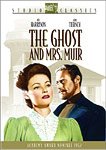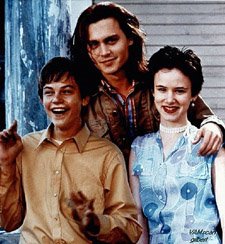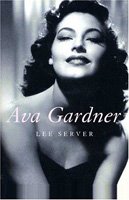 I haven't posted anything about an older film for a bit, so I thought I'd post my take on The Ghost and Mrs. Muir (1947). (This was written a year or two ago when the DVD came out.) ...
I haven't posted anything about an older film for a bit, so I thought I'd post my take on The Ghost and Mrs. Muir (1947). (This was written a year or two ago when the DVD came out.) ...If you’re looking to be frightened by a ghost movie, this is not the movie for you. While to some extent it is dressed up in the look of one, it’s a romance, and a melancholy one at that.
The Ghost and Mrs. Muir is a beautiful example of black and white filmmaking. There are some great shots and it's interesting to see how the movie uses camera technique and other tools to create mood etc. as opposed to using special effects. (For example, Harrison as the ghost appears out of shadows rather than "materializing.")
The movie is about a recent widow (Gene Tierney) who leaves the oppressive environment of her mother-in-law and sister’s home to take her daughter and live by the sea. She rents a home on the coast, one the real estate man urges her not to take. He reluctantly confesses it is haunted and, because of this, a problem house.
But Tierney’s Lucy Muir falls in love with Gull Cottage and takes it. After a few introductory “haunting” type scenes (less scarey than moody), she meets the ghost, a sea captain played by Rex Harrison. The relationship begins, and so does the real story.
While never explicitly stated (until the end), as an audience we know a romantic relationship is developing – each is falling in love with the other. I think this is because they recognize they share the same independent, uncompromising spirit. One is more overt (the ghost) and the other more restrained (Lucy), but both are informed by individuality.
Of course, the relationship is doomed since she is a living woman and he is a ghost.
Eventually the captain leaves Mrs. Muir because of this. He wants her to live as a flesh and blood woman and to find love with a living man, though he warns, “… there may be breakers ahead.”
There are and Lucy hits them.
The movie shows us an unusually independent woman. She asserts herself again and again though always with a contradictory sense of apology.
 Tierney plays Lucy in a playful way (as the DVD notes say, almost screwball). This quality she gives the character allows the film to show us the passage and transformations of time. The playfulness gives her a youthful quality in the first half of the film. As the movie progresses, and time passes, this becomes less and less, replaced by an introverted quietness. This interpretation, along with the wonderful score by Bernard Hermann, creates the melancholy feeling the movie’s opening scenes announced.
Tierney plays Lucy in a playful way (as the DVD notes say, almost screwball). This quality she gives the character allows the film to show us the passage and transformations of time. The playfulness gives her a youthful quality in the first half of the film. As the movie progresses, and time passes, this becomes less and less, replaced by an introverted quietness. This interpretation, along with the wonderful score by Bernard Hermann, creates the melancholy feeling the movie’s opening scenes announced.As time passes and the ghost of the sea captain is no longer in her life, Gene Tierney’s character becomes a lonely woman, almost eccentric.
The film gives us the inevitable Hollywood happy ending but it’s not enough to take away the essential sadness at the heart of the film. Tierney’s Lucy is a wonderful woman but out of step with her environment.
The only person she truly connects with, and who appreciates her independent spirit, is a ghost. The price for her independence is loneliness.
Tierney plays her part perfectly. Harrison, on the other hand, is a little over the top.
The Ghost and Mrs. Muir is a marvellous film. While it contains a lot of humour, it's primarily a romance, a sweetly melancholic one.


